Module 11 Way of life Unit 1 In China, we open a gift later.课件51张PPT
文档属性
| 名称 | Module 11 Way of life Unit 1 In China, we open a gift later.课件51张PPT | 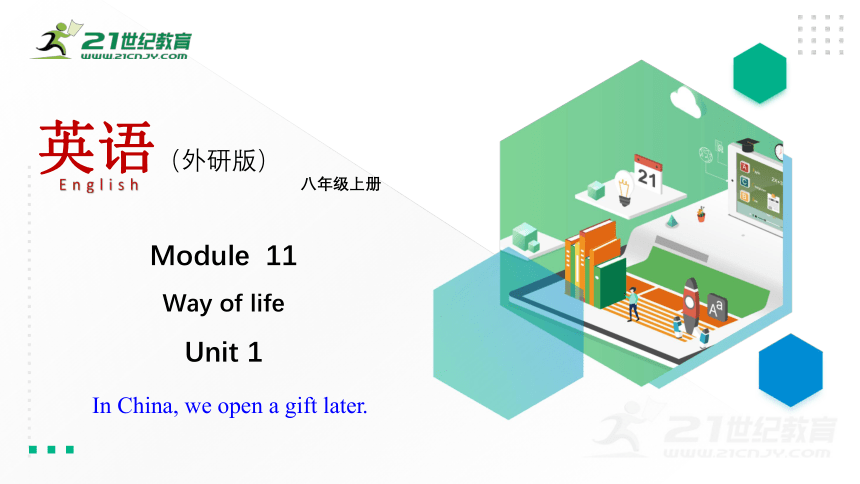 | |
| 格式 | pptx | ||
| 文件大小 | 31.0MB | ||
| 资源类型 | 试卷 | ||
| 版本资源 | 外研版 | ||
| 科目 | 英语 | ||
| 更新时间 | 2021-08-15 07:37:18 | ||
图片预览

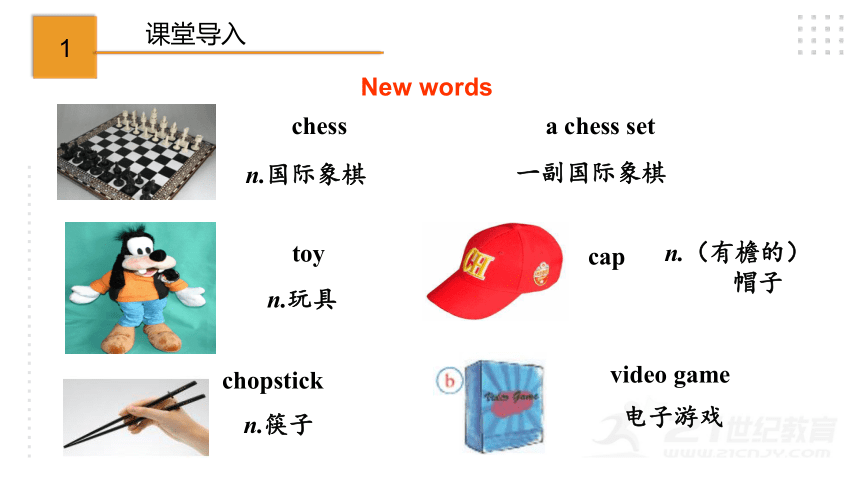
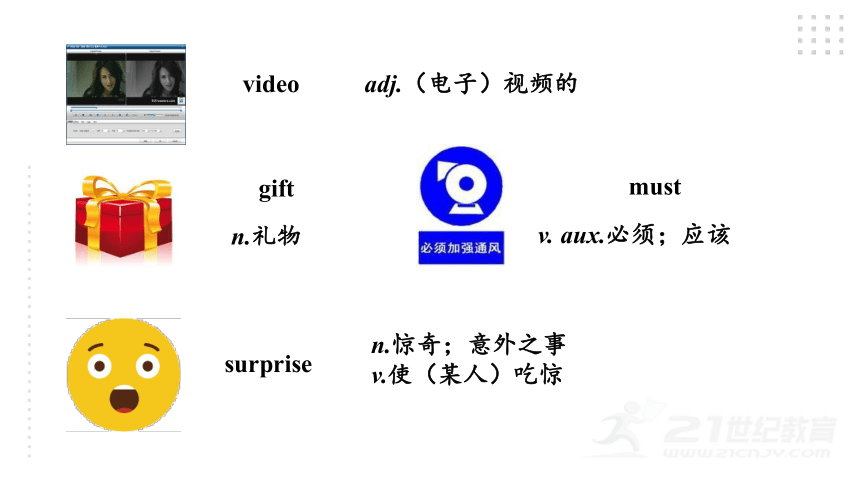
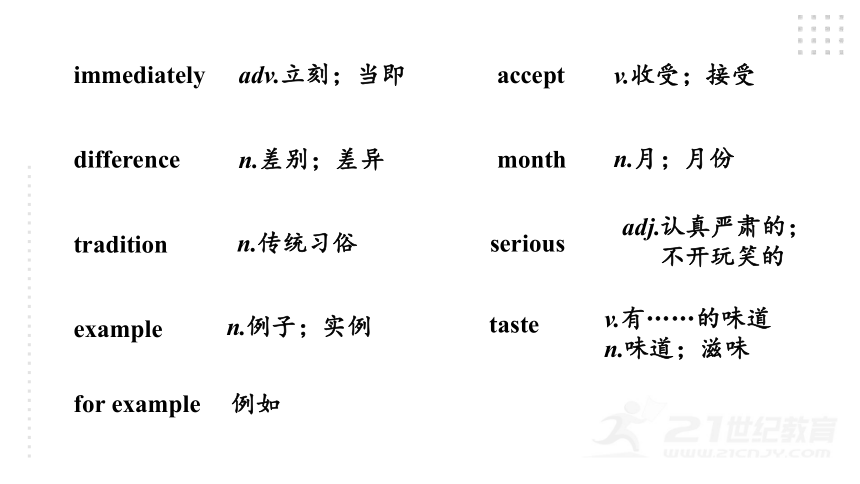

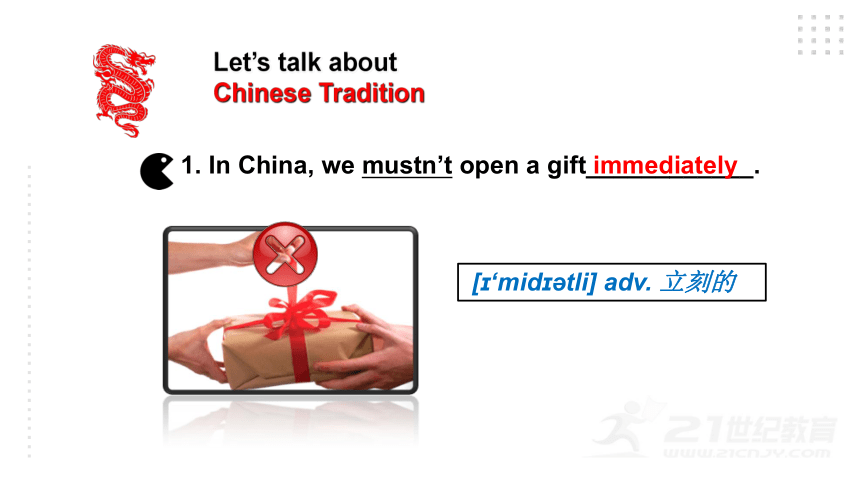
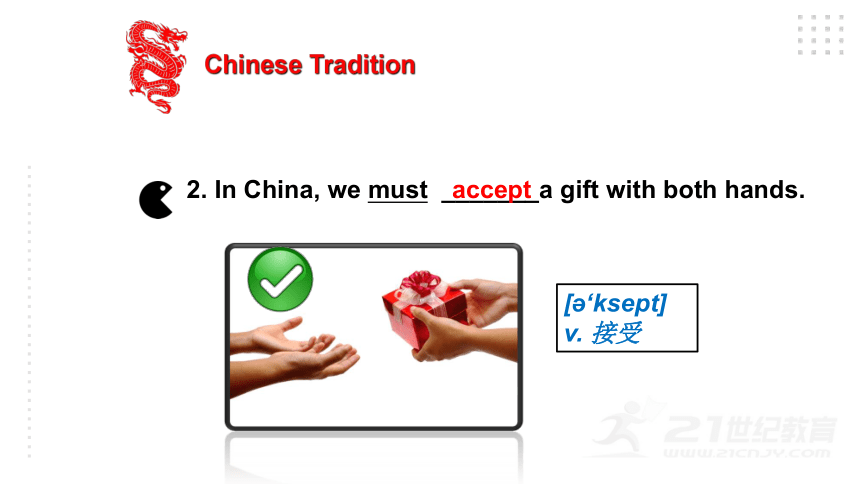
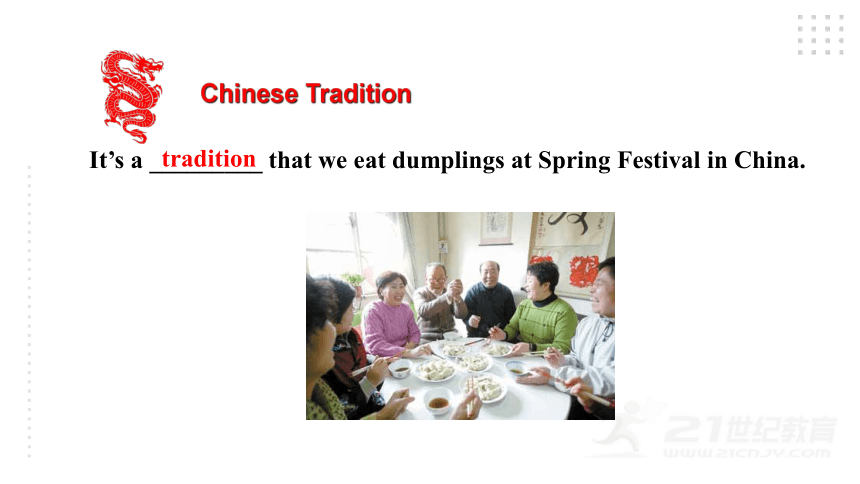
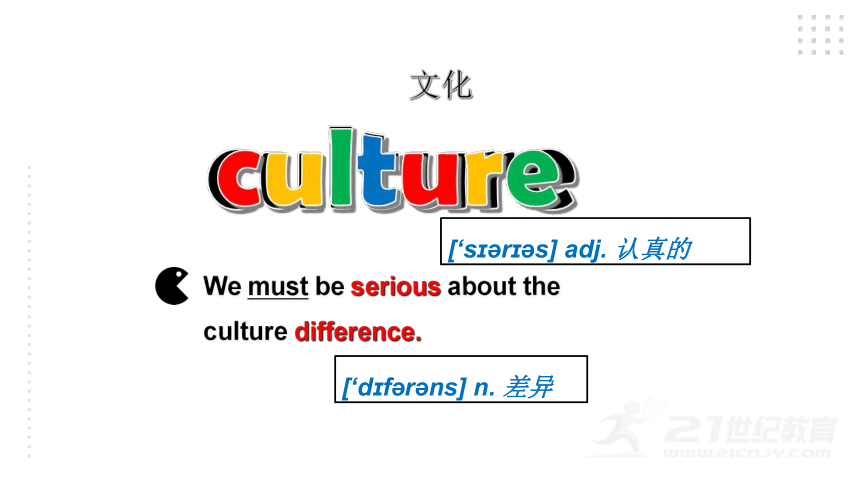
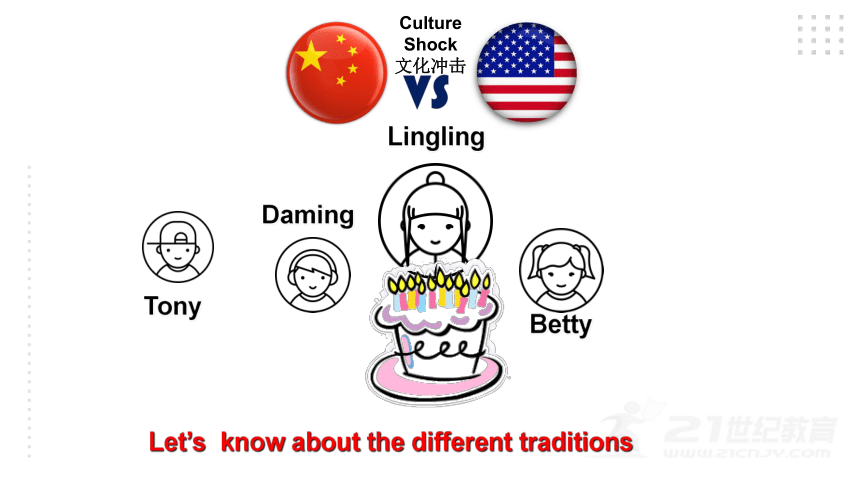
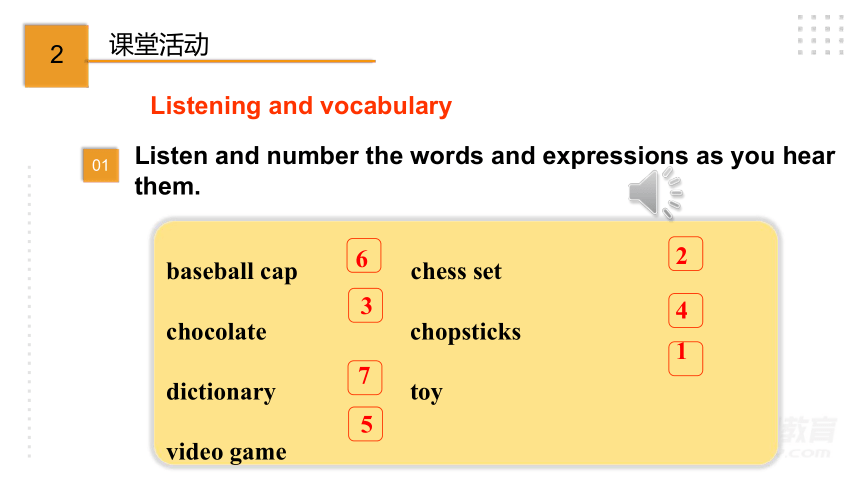
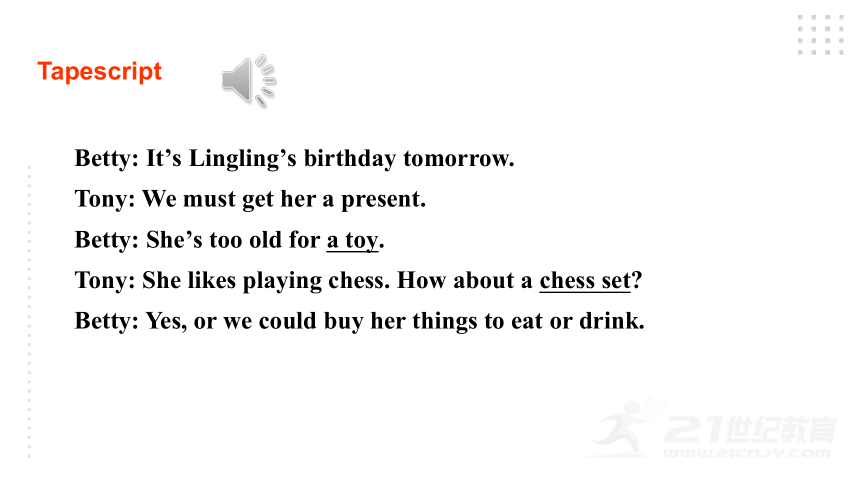
文档简介
英语(外研版)
八年级上册
English
Module 11
Way of life
Unit 1
In China, we open a gift later.
New words
chess
n.国际象棋
toy
n.玩具
cap
n.(有檐的)
帽子
a chess set
一副国际象棋
chopstick
n.筷子
video game
电子游戏
1
课堂导入
video
adj.(电子)视频的
gift
n.礼物
must
v. aux.必须;应该
surprise
n.惊奇;意外之事
v.使(某人)吃惊
immediately
adv.立刻;当即
difference
n.差别;差异
accept
v.收受;接受
month
n.月;月份
tradition
n.传统习俗
serious
adj.认真严肃的;
不开玩笑的
example
n.例子;实例
taste
v.有……的味道
n.味道;滋味
for example
例如
Different countries have different traditions
Let’s talk about
Chinese Tradition
1. In China, we mustn’t open a gift____________.
?[?‘mid??tli] adv. 立刻的
immediately
Chinese Tradition
2. In China, we must _______a gift with both hands.
[?‘ksept]
v. 接受
accept
It’s a _________ that we eat dumplings at Spring Festival in China.
tradition
Chinese Tradition
We must be serious about the culture difference.
[‘s??r??s] adj. 认真的
[‘d?f?r?ns] n. 差异
文化
Lingling
Daming
Tony
Betty
Culture Shock
文化冲击
Let’s know about the different traditions
Listening and vocabulary
Listen and number the words and expressions as you hear them.
baseball cap chess set
chocolate chopsticks
dictionary toy
video game
6
2
3
4
7
5
1
2
课堂活动
01
Betty: It’s Lingling’s birthday tomorrow.
Tony: We must get her a present.
Betty: She’s too old for a toy.
Tony: She likes playing chess. How about a chess set?
Betty: Yes, or we could buy her things to eat or drink.
Tapescript
Tony: She likes chocolate.
Betty: How about some nice chopsticks?
Tony: Or a video game?
Betty: Or how about a baseball cap?
Tony: I’ve got it! A dictionary!
Betty: Yes, an English dictionary. She can look up
new words in it.
Match the words and expressions in Activity
1 with the pictures.
baseball cap chess set
chocolate chopsticks
dictionary toy
video game
g
a
e
f
d
b
c
02
What present do they want to buy for Lingling?
An English dictionary.
Guess time
These are some ______. The kids like them.
toys
This is a ___________.
We can play chess on it.
chess set
This is a bar of _________. We can eat it and it tastes sweet.
chocolate
This is a ___________. We can wear it on our head.
baseball cap
This is a __________. We can look up new words in it.
dictionary
This is a pair of ____________.
We Chinese can eat with them.
chopsticks
We often receive ______ when
we have a birthday party.
gifts
This is a ___________. We can play with it.
video game
It’s a _________ that we eat dumplings at Spring Festival in China.
tradition
Listen and read.
Betty: Happy birthday, Lingling.
Daming: Here’s your gift.
Lingling: Oh, you remembered!
What a surprise!
Tony: You can open it!
Lingling: I don’t think I should
open it now. In China,
we open a gift later.
Everyday English
Oh, you remembered!
What a surprise!
It’s bad luck!
You can’t be serious!
Perfect!
03
Betty: But back in the US, we open a gift immediately.
Lingling: So what do I do?
Betty: You needn’t wait!
(Lingling opens her present and finds a dictionary)
Lingling: Oh, thank you. I really wanted one.
Betty: We’re happy you like it.
Tony: I noticed another difference. In China, you
accept a gift with both hands. But in
the West, we usually don’t pay much
attention to that.
Betty: That’s interesting! I’m interested to know
all the Chinese traditions. Tell me more.
Lingling: There are a lot. For example, in my home
town, people say you mustn’t do any cleaning
on the first day of the Spring Festival. And
you mustn’t break anything. It’s bad luck!
Daming: You must only use red paper for hongbao
because red means luck. And you’d better
not have your hair cut during the Spring
Festival month.
Tony: You can’t be serious!
Daming: And in the north of China, people eat
lots of jiaozi!
Betty: Perfect! They taste great.
Tony: I like eating jiaozi too. Anyway, the Spring
Festival is still over a month away. Let’s
celebrate Lingling’s birthday first!
Read the conversation and answer the questions.
1. When can people open the present in China?
2. Where must people open the present immediately?
3. Do people accept a present with both hands in the West?
1. When can people open the present in China?
2. Where must people open the present immediately?
3. Do people accept a present with both hands in the West?
They can open it later.
In the US.
No, they don’t.
Now check (√) what you usually do in China.
1 Open a present immediately when you receive it.
2 Accept a present with both hands.
3 Use red paper for hongbao.
4 Do cleaning on the first day of the Spring Festival.
5 Break something during the Spring Festival.
6 Have your hair cut during the Spring Festival month.
√
√
Complete the passage with the words in the box.
accept attention surprise taste traditions
It is always a(n) (1) ________ to receive gifts from family members and friends. In China, we usually (2)_______ a gift with both hands and open it later. But in the West, people usually do not pay much (3) __________ to that. During the Spring Festival, there are many (4) _________. For example, people in the north of China eat lots of jiaozi. They (5) _______ great.
surprise
accept
attention
traditions
taste
04
1. What a surprise!
这真是个惊喜!
To my surprise, he walked out without
saying a word.
令我吃惊的是,他一句话也没说就走了出去。
John turned around and looked at me in surprise.
约翰转过身来,惊奇地望着我。
surprise 作名词,意为“惊奇”,常用短语:
to one’s surprise 令某人吃惊的是
in surprise 惊奇地,吃惊地
Language points
2. But back in the US, we open a gift immediately.
但是在美国,我们会马上打开收到的礼物。
immediately作副词,意为“立刻,当即”。
Be quick! The match will begin immediately.
快点,比赛马上就开始了。
We should leave immediately.
我们应该立刻离开。
3. For example, in my home town, people say you mustn’t do any cleaning on the first day of the Spring Festival.
例:你可以在这里买水果,例如买柑橘和香蕉。
You can buy fruit here - oranges and bananas,
for example.
for example 例如
You must go to school on time.
4. You must only use red paper for hongbao because red means luck.
must表示“必须”,后面加动词原形。
mustn’t表示“禁止,一定不要”
例:你必须按时上学。
5. And you’d better not have your hair cut during the Spring Festival month. 正月里最好不要理发。
“have your hair cut /your house painted etc”:
He wants to have his TV repaired.
他想找人修电视。
We plan to have the house painted this week.
我们打算这星期要请人来粉刷房子。
a professional person
专业人士
cut your hair
paint your house, etc
to pay sb to do sth for you
6. They taste great. (饺子)很好吃。
taste为系动词,意为“尝起来”,后接形容词作表语。类似用法的还有:look, feel, smell, sound等。如:
The dumplings your mum made taste very delicious.
你妈妈做的饺子真好吃。
You look very tired.
你看起来很疲惫。
7. You can’t be serious!
serious adj. 表示“认真的,不开玩笑的”。
例:— 这次考试你拿了满分。
— 你是开玩笑的吧!
— You got a full mark in the exam.
— You can’t be serious!
1.这是给你的礼物。
2.好一个惊喜!
3.我觉得我不应该现在打开它。
4. 立即打开礼物
5.你不需要等
6.注意到另一个不同点
7.双手接受礼物
8.更多关注…
Here’s your gift.
What a surprise!
I don’t think
I should open it now.
open a gift immediately
You needn’t wait.
notice another difference
accept a gift with both hands
pay much attention to sth.
9.太有趣了
10.对做……感兴趣
11.例如,举个例子
12.大扫除,搞卫生
13.大年初一
14.最好不要做某事
15. 使头发被剪
16.你不是认真的吧.(开玩笑吗?)
17. 它们尝起来很棒。
That’s interesting.
be interested to do.
for example
do some cleaning
on the first day of the Spring Festival
had better not do sth.
have one’s hair cut
You can’t be serious.
They taste great.
Pronunciation and speaking
Read and predict how the speaker will pronounce the underlined words.
1. I don’t think I should open it now.
2. You needn’t wait!
3. You mustn’t break anything.
4. You must only use red paper for hongbao.
5. You’d better not have your hair cut during the Spring Festival month.
Now listen and check.
05
And try to understand their meanings.
Read the sentences in Activity 5 aloud.
06
Think about what you must and mustn’t/
can’t do in the situations. Write notes.
Must
Mustn’t/Can’t
At school
put up your hand before you talk
At the dining table
talk with food in your mouth
eat during
the class
wait for others to start the meal
Now work in pairs. Say what you must and mustn’t
/can’t do.
07
Do you know…?
You ________ _____ _______ (摘) flowers in a park.
mustn’t pick up
We _____ ______ the traffic rules.
must obey
We ___ ___ old people.(帮助)
must help
3
课堂小结
1. We have listened for specific information2. We have understood different traditions and social behaviors in the West and China
3. We have talked about talk about rules and customs at school and at the dining table
4. We have learned the key words and expressions.
一、选择题。
1.(重庆中考)________ special class we had today!
We learned about kung fu.
A. How B. What C. How a D. What a
4
课堂训练
3. The strawberries ________ delicious. You can have a try.
A. eat B. drink
C. taste D. sound
2. My bike is broken. I will have it ________ tomorrow morning.
A. fix up B. fixed up
C. repairing D. to repair
二、用 must, mustn’t和can’t 完成句子。
1. You _____ ______ (clean) the table.
You ________ ______ (wash) the bowls when you are jumping.
clean
wash
must
mustn’t
2. You ______ ______ (wash) your clothes on Sunday.
wash
You ________ ______ (play) the guitar every evening.
play
must
mustn’t
3. You ________ ________ (make) the garden so dirty.
make
You ________ ________ (help) your mother keep the garden beautiful.
help
must
mustn’t
You _______ _______ (clean) the floor with a towel.
(毛巾)
4. You _______ _______ (clean) the floor with a mop. (拖把)
clean
clean
must
can’t
https://www.21cnjy.com/help/help_extract.php
八年级上册
English
Module 11
Way of life
Unit 1
In China, we open a gift later.
New words
chess
n.国际象棋
toy
n.玩具
cap
n.(有檐的)
帽子
a chess set
一副国际象棋
chopstick
n.筷子
video game
电子游戏
1
课堂导入
video
adj.(电子)视频的
gift
n.礼物
must
v. aux.必须;应该
surprise
n.惊奇;意外之事
v.使(某人)吃惊
immediately
adv.立刻;当即
difference
n.差别;差异
accept
v.收受;接受
month
n.月;月份
tradition
n.传统习俗
serious
adj.认真严肃的;
不开玩笑的
example
n.例子;实例
taste
v.有……的味道
n.味道;滋味
for example
例如
Different countries have different traditions
Let’s talk about
Chinese Tradition
1. In China, we mustn’t open a gift____________.
?[?‘mid??tli] adv. 立刻的
immediately
Chinese Tradition
2. In China, we must _______a gift with both hands.
[?‘ksept]
v. 接受
accept
It’s a _________ that we eat dumplings at Spring Festival in China.
tradition
Chinese Tradition
We must be serious about the culture difference.
[‘s??r??s] adj. 认真的
[‘d?f?r?ns] n. 差异
文化
Lingling
Daming
Tony
Betty
Culture Shock
文化冲击
Let’s know about the different traditions
Listening and vocabulary
Listen and number the words and expressions as you hear them.
baseball cap chess set
chocolate chopsticks
dictionary toy
video game
6
2
3
4
7
5
1
2
课堂活动
01
Betty: It’s Lingling’s birthday tomorrow.
Tony: We must get her a present.
Betty: She’s too old for a toy.
Tony: She likes playing chess. How about a chess set?
Betty: Yes, or we could buy her things to eat or drink.
Tapescript
Tony: She likes chocolate.
Betty: How about some nice chopsticks?
Tony: Or a video game?
Betty: Or how about a baseball cap?
Tony: I’ve got it! A dictionary!
Betty: Yes, an English dictionary. She can look up
new words in it.
Match the words and expressions in Activity
1 with the pictures.
baseball cap chess set
chocolate chopsticks
dictionary toy
video game
g
a
e
f
d
b
c
02
What present do they want to buy for Lingling?
An English dictionary.
Guess time
These are some ______. The kids like them.
toys
This is a ___________.
We can play chess on it.
chess set
This is a bar of _________. We can eat it and it tastes sweet.
chocolate
This is a ___________. We can wear it on our head.
baseball cap
This is a __________. We can look up new words in it.
dictionary
This is a pair of ____________.
We Chinese can eat with them.
chopsticks
We often receive ______ when
we have a birthday party.
gifts
This is a ___________. We can play with it.
video game
It’s a _________ that we eat dumplings at Spring Festival in China.
tradition
Listen and read.
Betty: Happy birthday, Lingling.
Daming: Here’s your gift.
Lingling: Oh, you remembered!
What a surprise!
Tony: You can open it!
Lingling: I don’t think I should
open it now. In China,
we open a gift later.
Everyday English
Oh, you remembered!
What a surprise!
It’s bad luck!
You can’t be serious!
Perfect!
03
Betty: But back in the US, we open a gift immediately.
Lingling: So what do I do?
Betty: You needn’t wait!
(Lingling opens her present and finds a dictionary)
Lingling: Oh, thank you. I really wanted one.
Betty: We’re happy you like it.
Tony: I noticed another difference. In China, you
accept a gift with both hands. But in
the West, we usually don’t pay much
attention to that.
Betty: That’s interesting! I’m interested to know
all the Chinese traditions. Tell me more.
Lingling: There are a lot. For example, in my home
town, people say you mustn’t do any cleaning
on the first day of the Spring Festival. And
you mustn’t break anything. It’s bad luck!
Daming: You must only use red paper for hongbao
because red means luck. And you’d better
not have your hair cut during the Spring
Festival month.
Tony: You can’t be serious!
Daming: And in the north of China, people eat
lots of jiaozi!
Betty: Perfect! They taste great.
Tony: I like eating jiaozi too. Anyway, the Spring
Festival is still over a month away. Let’s
celebrate Lingling’s birthday first!
Read the conversation and answer the questions.
1. When can people open the present in China?
2. Where must people open the present immediately?
3. Do people accept a present with both hands in the West?
1. When can people open the present in China?
2. Where must people open the present immediately?
3. Do people accept a present with both hands in the West?
They can open it later.
In the US.
No, they don’t.
Now check (√) what you usually do in China.
1 Open a present immediately when you receive it.
2 Accept a present with both hands.
3 Use red paper for hongbao.
4 Do cleaning on the first day of the Spring Festival.
5 Break something during the Spring Festival.
6 Have your hair cut during the Spring Festival month.
√
√
Complete the passage with the words in the box.
accept attention surprise taste traditions
It is always a(n) (1) ________ to receive gifts from family members and friends. In China, we usually (2)_______ a gift with both hands and open it later. But in the West, people usually do not pay much (3) __________ to that. During the Spring Festival, there are many (4) _________. For example, people in the north of China eat lots of jiaozi. They (5) _______ great.
surprise
accept
attention
traditions
taste
04
1. What a surprise!
这真是个惊喜!
To my surprise, he walked out without
saying a word.
令我吃惊的是,他一句话也没说就走了出去。
John turned around and looked at me in surprise.
约翰转过身来,惊奇地望着我。
surprise 作名词,意为“惊奇”,常用短语:
to one’s surprise 令某人吃惊的是
in surprise 惊奇地,吃惊地
Language points
2. But back in the US, we open a gift immediately.
但是在美国,我们会马上打开收到的礼物。
immediately作副词,意为“立刻,当即”。
Be quick! The match will begin immediately.
快点,比赛马上就开始了。
We should leave immediately.
我们应该立刻离开。
3. For example, in my home town, people say you mustn’t do any cleaning on the first day of the Spring Festival.
例:你可以在这里买水果,例如买柑橘和香蕉。
You can buy fruit here - oranges and bananas,
for example.
for example 例如
You must go to school on time.
4. You must only use red paper for hongbao because red means luck.
must表示“必须”,后面加动词原形。
mustn’t表示“禁止,一定不要”
例:你必须按时上学。
5. And you’d better not have your hair cut during the Spring Festival month. 正月里最好不要理发。
“have your hair cut /your house painted etc”:
He wants to have his TV repaired.
他想找人修电视。
We plan to have the house painted this week.
我们打算这星期要请人来粉刷房子。
a professional person
专业人士
cut your hair
paint your house, etc
to pay sb to do sth for you
6. They taste great. (饺子)很好吃。
taste为系动词,意为“尝起来”,后接形容词作表语。类似用法的还有:look, feel, smell, sound等。如:
The dumplings your mum made taste very delicious.
你妈妈做的饺子真好吃。
You look very tired.
你看起来很疲惫。
7. You can’t be serious!
serious adj. 表示“认真的,不开玩笑的”。
例:— 这次考试你拿了满分。
— 你是开玩笑的吧!
— You got a full mark in the exam.
— You can’t be serious!
1.这是给你的礼物。
2.好一个惊喜!
3.我觉得我不应该现在打开它。
4. 立即打开礼物
5.你不需要等
6.注意到另一个不同点
7.双手接受礼物
8.更多关注…
Here’s your gift.
What a surprise!
I don’t think
I should open it now.
open a gift immediately
You needn’t wait.
notice another difference
accept a gift with both hands
pay much attention to sth.
9.太有趣了
10.对做……感兴趣
11.例如,举个例子
12.大扫除,搞卫生
13.大年初一
14.最好不要做某事
15. 使头发被剪
16.你不是认真的吧.(开玩笑吗?)
17. 它们尝起来很棒。
That’s interesting.
be interested to do.
for example
do some cleaning
on the first day of the Spring Festival
had better not do sth.
have one’s hair cut
You can’t be serious.
They taste great.
Pronunciation and speaking
Read and predict how the speaker will pronounce the underlined words.
1. I don’t think I should open it now.
2. You needn’t wait!
3. You mustn’t break anything.
4. You must only use red paper for hongbao.
5. You’d better not have your hair cut during the Spring Festival month.
Now listen and check.
05
And try to understand their meanings.
Read the sentences in Activity 5 aloud.
06
Think about what you must and mustn’t/
can’t do in the situations. Write notes.
Must
Mustn’t/Can’t
At school
put up your hand before you talk
At the dining table
talk with food in your mouth
eat during
the class
wait for others to start the meal
Now work in pairs. Say what you must and mustn’t
/can’t do.
07
Do you know…?
You ________ _____ _______ (摘) flowers in a park.
mustn’t pick up
We _____ ______ the traffic rules.
must obey
We ___ ___ old people.(帮助)
must help
3
课堂小结
1. We have listened for specific information2. We have understood different traditions and social behaviors in the West and China
3. We have talked about talk about rules and customs at school and at the dining table
4. We have learned the key words and expressions.
一、选择题。
1.(重庆中考)________ special class we had today!
We learned about kung fu.
A. How B. What C. How a D. What a
4
课堂训练
3. The strawberries ________ delicious. You can have a try.
A. eat B. drink
C. taste D. sound
2. My bike is broken. I will have it ________ tomorrow morning.
A. fix up B. fixed up
C. repairing D. to repair
二、用 must, mustn’t和can’t 完成句子。
1. You _____ ______ (clean) the table.
You ________ ______ (wash) the bowls when you are jumping.
clean
wash
must
mustn’t
2. You ______ ______ (wash) your clothes on Sunday.
wash
You ________ ______ (play) the guitar every evening.
play
must
mustn’t
3. You ________ ________ (make) the garden so dirty.
make
You ________ ________ (help) your mother keep the garden beautiful.
help
must
mustn’t
You _______ _______ (clean) the floor with a towel.
(毛巾)
4. You _______ _______ (clean) the floor with a mop. (拖把)
clean
clean
must
can’t
https://www.21cnjy.com/help/help_extract.php
同课章节目录
- Module 1 How to learn English
- Unit 1 Let's try to speak English as much as possi
- Unit 2 You should smile at her.
- Unit 3 Language in use .
- Module 2 My home town and my country
- Unit 1 It's taller than many other buildings.
- Unit 2 Cambridge is a beautiful city in the east o
- Unit 3 Language in use .
- Module 3 Sports.
- Unit 1 Nothing is more exciting than playing tenni
- Unit 2 This year we training more carefully.
- Unit 3 Language in use .
- Module 4 Planes, ships and trains .
- Unit 1 He lives the farthest from school.
- Unit 2 What is the best way to travel.
- Unit 3 Language in use .
- Module 5 Lao She Teahouse.
- Unit 1 I wanted to see the Beijing Opera.
- Unit 2 It descibes the changes in Chinese society.
- Unit 3 Language in use .
- Module 6 Animals in danger.
- Unit 1 It allows people to get closer to them .
- Unit 2 The WWF is working hard to save them all.
- Unit 3 Language in use .
- Revision module A
- Module 7 A famous story
- Unit 1 Alice was sitting with her sister by the ri
- Unit 2 She was thinking about her cat.
- Unit 3 Language in use .
- Module 8 Accidents
- Unit 1 While the car were changing to red, a car s
- Unit 2 I was trying to pick it up when it bite me
- Unit 3 Language in use .
- Module 9 Population
- Unit 1 The population of China is about 1.37 billi
- Unit 2 Arnwick was a city with 200,000 people.
- Unit 3 Language in use .
- Module 10 The weathe
- Unit 1 It might snow.
- Unit 2 The weather is fine all year round.
- Unit 3 Language in use .
- Module 11 Way of life
- Unit 1 In China ,we open a gift later.
- Unit 2 In England, you usually drink tea with milk
- Unit 3 Language in use .
- Module 12 Help
- Unit 1 What should we do before help arrives?
- Unit 2 Stay away from windows and heavy furniture.
- Unit 3 Language in use .
- Revision module B
